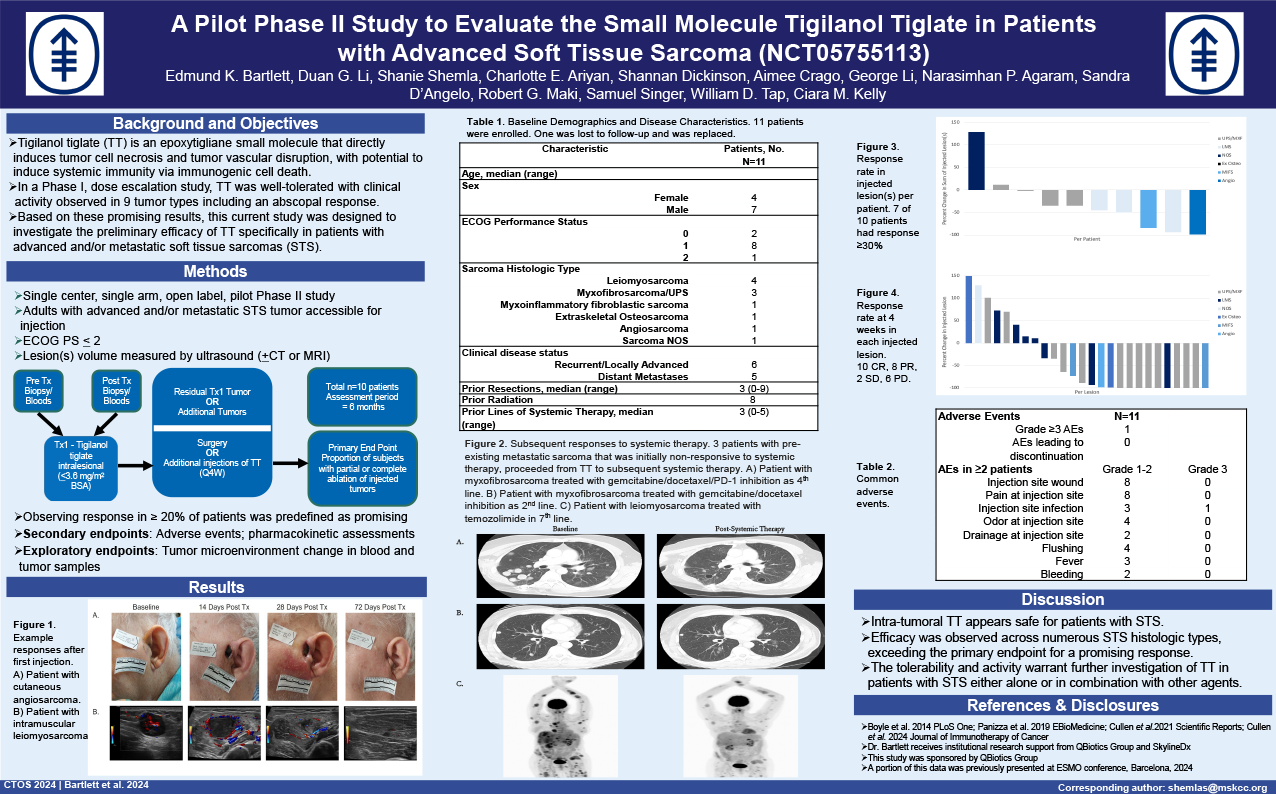QBiotics Phase IIa Soft Tissue Sarcoma trial extended, following positive data presented at CTOS
BRISBANE, 19 November 2024.
- Data from Phase IIa clinical trial (QB46C-H07) evaluating QBiotics’ small molecule, tigilanol tiglate (TT) in patients with advanced Soft Tissue Sarcoma (STS) presented at the Connective Tissue Oncology Society (CTOS) Annual Meeting (San Diego, CA: 13-16 November 2024).
- This new data follows presentation of preliminary data at the European Society for Medical Oncology (ESMO) conference 2024 (Spain, September 2024), which highlighted that TT appeared safe for patients with STS, with early indications of efficacy.
- CTOS presentation includes additional observations made by the investigators showing that patients with metastatic STS disease who were originally non-responsive to systemic therapies began to respond to systemic therapy after treatment with TT.
- These new trial discoveries have led QBiotics to extend the study. Ethics approval has been granted for this extension, and QBiotics is preparing to initiate the extension arm in Q1 2025.
QBiotics Group Limited (QBiotics) is pleased to share a copy of the poster presentation providing new, positive data from its Phase IIa tigilanol tiglate (TT) clinical trial in Soft Tissue Sarcoma (STS) and announce that the trial will be extended to further investigate these new findings.
The new poster was presented at the Connective Tissue Oncology Society (CTOS) Annual Meeting 2024 in San Diego by Principal Investigator on the trial, Edmund Bartlett, MD from Memorial Sloan Kettering Cancer Center (New York, USA).
The trial completed recruitment in June 2024 which followed TT being awarded Orphan Drug Designation for the treatment of STS by the United States Food and Drug Administration (FDA) earlier this year.
Preliminary data was presented at the ESMO 2024 conference, indicating that TT appears safe for patients with STS, with early signs of efficacy. Clinicians from the trial believed that the tolerability and activity observed warranted further investigation of TT in patients with STS.
The new (CTOS) presentation includes additional observations made by the investigators outside of the clinical study showing that patients with metastatic STS disease who were originally non-responsive to systemic therapy responded to systemic therapy after TT was used as the primary treatment of their primary tumour.
QBiotics’ CEO, Stephen Doyle commented, “This new data supports our hypothesis on possible mechanisms of action for tigilanol tiglate. The idea of introducing a novel therapeutic that activates the immune system to enhance the efficacy of standard treatments is highly compelling. In our trial extension, we’ll be closely monitoring for additional indications that the drug is functioning in this way.
We extend our sincere thanks to Dr. Edmund Bartlett and his team at Memorial Sloan Kettering Cancer Center for presenting these findings on tigilanol tiglate in STS and for their dedicated support throughout the trial.”
There were approximately 128,000 new cases of STS globally in 2023, with the incidence growing at 0.54% per year1.
ABOUT TRIAL QB46C-H07
QB46C-H07 (Clinical trial registration number NCT05755113) is a pilot Phase IIa, open label clinical trial to evaluate the preliminary efficacy and safety of intratumoural tigilanol tiglate in patients with a range of advanced and/or metastatic STS.
The Primary Endpoint is ablation rate defined as the proportion of patients achieving ≥30% reduction in tumour volume assessed by ultrasound compared to baseline.
The Secondary Endpoint is to assess safety and tolerability of tigilanol tiglate by assessing the incidence of adverse events and serious adverse events, and pharmacokinetics.
Exploratory Endpoints include local rate of recurrence at the injection site at 6 months post initial injection, and assessment of tumour response in biopsy samples. Biopsies were taken at baseline and at 14 days post-injection, and surgical specimens and blood samples will be used to assess changes in tumour biomarkers.
- Study authors: Edmund K. Bartlett, Duan G. Li, Shanie Shemla, Charlotte E. Ariyan, Shannan Dickinson, Aimee Crago, George Li, Narasimhan P. Agaram, Sandra D’Angelo, Robert G. Maki, Samuel Singer, William D. Tap, Ciara M. Kelly
- GlobalData®, American Cancer Society, Cancer Australia, Cancer Research UK, Canadian Cancer Society.
—ends—
FURTHER INFORMATION
STEPHEN DOYLE, CEO & MANAGING DIRECTOR
communications@qbiotics.com or
MEDIA ENQUIRIES / NOTES FOR EDITORS
JANE LOWE, IR DEPARTMENT
jane.lowe@irdepartment.com.au +61 411 117 774
ABOUT QBIOTICS
QBiotics is an unlisted public Australian life sciences company that specialises in the discovery and development of novel cell signalling small molecules. QBiotics applies phenotypic screening to generate breakthrough innovation in the discovery of first in class solutions to challenging medical conditions. Our current clinical focus is on novel treatments for cancer and debilitating chronic wounds.
QBiotics’ lead oncology drug, tigilanol tiglate, is a small molecule targeting a range of solid tumours and is currently in human clinical Phase II development. A veterinary formulation of tigilanol tiglate is registered and marketed as an oncology pharmaceutical, under the trade name STELFONTA®, in the USA, Europe, the UK and Australia.
QBiotics’ lead wound healing drug candidate, EBC 1013 is a small molecule targeting a range of wounds including chronic and acute wounds and burns. A first-in-human Phase I clinical development in patients with venous leg ulcers is open for recruitment.

